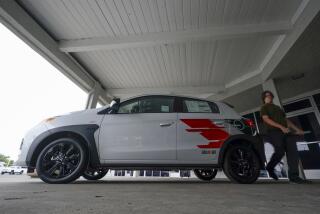A Loss of Value Any Car Buyer Can Appreciate
- Share via
Car and truck buyers have been hearing it for years: The moment that shiny-new vehicle drives off the showroom floor, its value will depreciate by thousands of dollars.
Depreciation is a fact of vehicle ownership life. It affects leasing costs as well.
The sad fact is that the cost of depreciation typically exceeds insurance, interest charges, license fees and gas and maintenance costs during a vehicle’s early years. Some can lose as much as 20% of their value in their first year on the road.
IntelliChoice, which provides consumers with data on the real cost of owning cars and trucks, has been analyzing the numbers since 1986. It has found that depreciation now accounts for an average of 35.1% of the total cost of a car during its first five years. Car and truck owners don’t receive monthly invoices for depreciation. But rest assured, they’ll pay the bill when it comes time to sell their vehicles.
You can’t escape by leasing. Monthly lease payments are determined, in large part, by how much the vehicle is expected to be worth at the end of the lease. And since most leases are for just two or three years--the years when vehicles depreciate the most--leasing actually locks you into higher depreciation costs.
There is some good news, though. After the first five years of ownership, the costs of depreciation tend to flatten. So the longer you hang on to a vehicle, the less that depreciation affects overall costs.
There are numerous facts about depreciation that consumers should fit into their decision making, whether leasing or buying a new or used vehicle:
* Popular models from well-known manufacturers hold their value longer. Lesser-known models tend to depreciate fastest.
* Convertibles tend to hold their value better than hardtops. There’s a saying among new-car retailers that “when the top goes down, the price goes up.” This holds true when it comes time for the consumer to sell or trade in a convertible.
* Trucks and sport-utility vehicles tend to hold their resale value better than hardtop passenger cars.
* Depreciation costs should be a primary consideration for people who plan to sell their vehicles after just a couple of years. Conversely, those who hang on to a car or truck for a long time are minimizing the effects of depreciation.
* Vehicles that depreciate quickly are often good values for used-car buyers. Those that depreciate more slowly are good values as new cars.
* Vehicles that don’t change body style very often tend to hold their value. A model change--or a decision by a manufacturer to drop a particular model from its line--can make the previous model look dated and therefore can decrease resale value substantially.
* The extra expense of some options, such as air conditioning or larger, more powerful engines, pays off with higher value at resale time.
* To minimize the effects of depreciation on overall costs of ownership, buy a base model rather than a “limited” or “luxury” edition.
*
In addition to these factors, a vehicle’s resale value is going to vary depending on its mileage, condition and amount of optional equipment as well as the geographical area in which the vehicle is being sold.
As the accompanying graph illustrates, you can beat depreciation by buying stocks (or fine art or even Beanie Babies). But other investments can’t take the kids to school, carry the groceries home or provide that new-car smell and the satisfaction that comes with driving a new vehicle away from the dealership.
IntelliChoice is projecting that during the next five years, the 1998 Honda Civic DX Coupe will lead the depreciation derby among cars by holding on to about 73% of its original price through 2003. The leading small truck, the 1998 Jeep Wrangler SE, is expected to maintain about 76% of its value. On the other end of the spectrum, some cars and trucks will decrease to as little as 39% of their purchase price.
*
Peter Levy is founder and chief executive of Campbell, Calif.-based IntelliChoice Inc., which measures car-ownership costs and awards a Best Overall Value of the Year citation. On the World Wide Web: https://www.intellichoice.com.
(BEGIN TEXT OF INFOBOX / INFOGRAPHIC)
Ticker Shock
A new car is may things--basic daily transportation, family vacation conveyance, even a status symbol--but it’s not an investment. Cars, as these figures indicate, depreciate--a lot.Here’s a comparison of the declining value of a 1993 Ford Taurus and the increasing value of $17,000 investment in the New York Stock Exchange composite index:
1998:
1993 Ford Taurus: $8,248
NYSE composite: $38,780
* Note: Values as of March 29 each year
* Source: IntelliChoice Inc.
More to Read
Inside the business of entertainment
The Wide Shot brings you news, analysis and insights on everything from streaming wars to production — and what it all means for the future.
You may occasionally receive promotional content from the Los Angeles Times.










